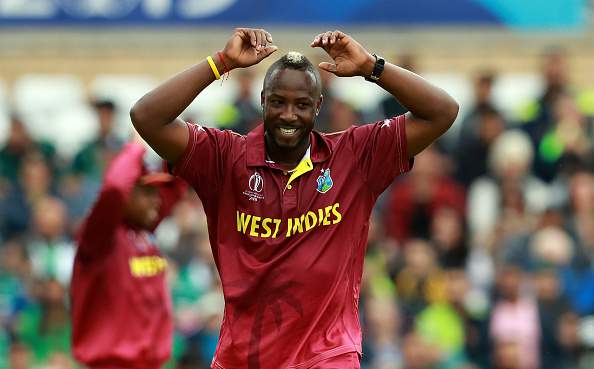Don’t let anyone convince you that history only remembers the winners. Holland in 1974. New Zealand in 2015. We remember those that made us feel things, those that defined moments and tournaments with performances that will never fall into line with others.
Carlos Brathwaite – WI will remember the name.
 Carlos Brathwaite hit five sixes yesterday – brutal, totemic sixes. 30 iconic runs from all out assaults on the New Zealand attack. Five shots. Just short of six.
Carlos Brathwaite hit five sixes yesterday – brutal, totemic sixes. 30 iconic runs from all out assaults on the New Zealand attack. Five shots. Just short of six.
Brathwaite hit 25 runs off Matt Henry, in the 48th over of the game: 25% of his total runs in five minutes and 50 seconds of absolute, utter chaos. It brought West Indies’ prospects up from a 3% chance to a 45% chance, from a shot in the dark to within touching distance. Five minutes, fifty seconds. Just short of six.
Carlos Brathwaite hit Jimmy Neesham to long-on. A muscular parabola, the ball arced high into the Manchester sky, white on black in the night, arcing towards the fielder unfortunately unable to make a six.
 When Brathwaite came to the crease, West Indies were 142-4. They were almost exactly halfway to their target, but it felt an awful lot further away than that. In the overs that followed, they lost Chris Gayle, Ashley Nurse and Evin Lewis.
When Brathwaite came to the crease, West Indies were 142-4. They were almost exactly halfway to their target, but it felt an awful lot further away than that. In the overs that followed, they lost Chris Gayle, Ashley Nurse and Evin Lewis.
When Lewis fell, their chances with WinViz dropped to 1%.
Unlike most team sports, cricket is binary. Ties go down in history, and you can count them on your hand. In white ball cricket, you win or you lose. You’re up, or you’re down. You’re dead, or you’re alive.
Brathwaite knows that if you’re still stood at the crease, you still have a chance. That’s why, when all others around him were falling, he stood, and let the action happen. He let the game come to him. As the wickets fell, and the game began to flat-line, Brathwaite just hung. He put no pressure on himself to hit out from the start, absolving himself of blame with easy talk of aggression or counter-attacks. He calmly, authoritatively, took the burden of the whole game, the whole campaign, on his broad Bajan shoulders, and waited.
Brathwaite attacked only 18 of the first 60 deliveries he faced in Manchester yesterday. He gave himself the option to sit, to assess the situation, to gather information about the pitch and the bowlers, knowing he had firepower to come. He knew that, for all the runs required and all the balls remaining, this was essentially in hand.
 From the moment he arrived at the crease, another 137 runs came from the bats of the West Indian side; 101 came from Brathwaite’s.
From the moment he arrived at the crease, another 137 runs came from the bats of the West Indian side; 101 came from Brathwaite’s.
He bided his time, waited; stealing from over to over, getting closer to the desired target in tiny increments, nothing more. He knew the end could be emphatic, he’s always had it in him.
 After those first 60 deliveries, he attacked 18 of the next 22. He made a break for it, and it was sustained. The 36 attacking shots Brathwaite played was the most he’s ever played in an ODI innings. It was twice as many as he’s ever played before in a single match.
After those first 60 deliveries, he attacked 18 of the next 22. He made a break for it, and it was sustained. The 36 attacking shots Brathwaite played was the most he’s ever played in an ODI innings. It was twice as many as he’s ever played before in a single match.
 But he picked his deliveries. This wasn’t indiscriminate slogging, in the slightest. Brathwaite knows his strengths and weaknesses all too well, and approached this task appropriately.
But he picked his deliveries. This wasn’t indiscriminate slogging, in the slightest. Brathwaite knows his strengths and weaknesses all too well, and approached this task appropriately.
 Few cricketers in the world are as intelligent in terms of using their skills as efficiently. His scoring yesterday was clinical, his attacking strokes destructive, but they came against full pitched bowling.
Few cricketers in the world are as intelligent in terms of using their skills as efficiently. His scoring yesterday was clinical, his attacking strokes destructive, but they came against full pitched bowling.
 Terrifyingly, out of nowhere, Williamson suddenly clocked what was going on. He tuned into the destruction, and knew what he had to do to get his side over the line.
Terrifyingly, out of nowhere, Williamson suddenly clocked what was going on. He tuned into the destruction, and knew what he had to do to get his side over the line.
The last eight balls Brathwaite faced were all short. New Zealand had realised as a collective what was happening. Anything in the slot, or near it, was going the distance, but there was more causing Brathwaite issues. This was their in, their last chance to save face.
Ferguson, the short ball specialist – no Black Caps seamers has sent down more bouncers in this World Cup – had bowled out. So Williamson turned to Neesham, a man always willing to do a job, and from what we can tell from the sidelines, told him to bowl short every ball.
 He was dismissed by a short ball. The only type of bowling he never got hold of. Williamson had sussed him, just in time.
He was dismissed by a short ball. The only type of bowling he never got hold of. Williamson had sussed him, just in time.
Brathwaite was left, on his own, on the floor in a moment that called to mind those other great valiant defeats. Lee in 2005, particularly, was at the forefront, the sense of a player so close to snatching unlikely victory, denied it at the last minute. This was a man who had walked all the way up to the mirror, the emphatic binary of win and lose, and fallen short with his nose touching glass.
No other innings this World Cup has had a higher impact on their side, in any given game. No other individual can walk back into the dressing room, look their teammates in the eye, and say that they did more.
 It’s frustrating, but we can’t talk about this innings, without talking about that innings. Kolkata, April 3rd, 2016. Brathwaite does what we all know he did, hitting four consecutive sixes off Ben Stokes in the most remarkable end to a cricket match ever seen. We remember the way it all unfolded, the thrill, the shock, the name. The game was England’s, and then it was gone.
It’s frustrating, but we can’t talk about this innings, without talking about that innings. Kolkata, April 3rd, 2016. Brathwaite does what we all know he did, hitting four consecutive sixes off Ben Stokes in the most remarkable end to a cricket match ever seen. We remember the way it all unfolded, the thrill, the shock, the name. The game was England’s, and then it was gone.
Briefly, on Friday night, Stokes saw his own shot at redemption, his own opportunity to wrestle a victory out of the jaws of defeat with his hands only. It slipped away. Mark Wood was unable to play his part with the bat, and Stokes’ latest redemptive shot was struck out. It could be his last. These moments come along ever so rarely.
That’s the beauty of days like yesterday. It’s not in the tumult of the back and forth, the fortunes of two sides thrown from side to side, sparing only one. It’s that performances like Brathwaite’s are so rare, and for one man to produce two in a lifetime – no, in three years – is nothing short of astonishing.
CricViz Analysis
 Pooran smashed 11 fours and four sixes to top all scorers in the contest with 118 off 103 balls before he was dismissed in the 48th over, caught behind off Angelo Mathews, bowling in an ODI for the first time since December 2017, and carried the West Indies’ chances of victory with him back to the pavilion.
Pooran smashed 11 fours and four sixes to top all scorers in the contest with 118 off 103 balls before he was dismissed in the 48th over, caught behind off Angelo Mathews, bowling in an ODI for the first time since December 2017, and carried the West Indies’ chances of victory with him back to the pavilion. The 23-year-old Pooran dominated a 54-run, sixth-wicket stand with Carlos Brathwaite before sharing 83 for the seventh-wicket with Fabian Allen to revive the West Indies’ flagging chances in the second half of the game which was watched by Barbados-born singing sensation, Rihanna.
The 23-year-old Pooran dominated a 54-run, sixth-wicket stand with Carlos Brathwaite before sharing 83 for the seventh-wicket with Fabian Allen to revive the West Indies’ flagging chances in the second half of the game which was watched by Barbados-born singing sensation, Rihanna. Brathwaite made just eight from 15 balls before he was run out in the 35th over and the same fate befell Allen 10 overs later, after he made a career-best 51 from 32 balls.
Brathwaite made just eight from 15 balls before he was run out in the 35th over and the same fate befell Allen 10 overs later, after he made a career-best 51 from 32 balls. West Indies face Afghanistan in their final match of the tournament on Thursday at Headingley in Leeds.
West Indies face Afghanistan in their final match of the tournament on Thursday at Headingley in Leeds.
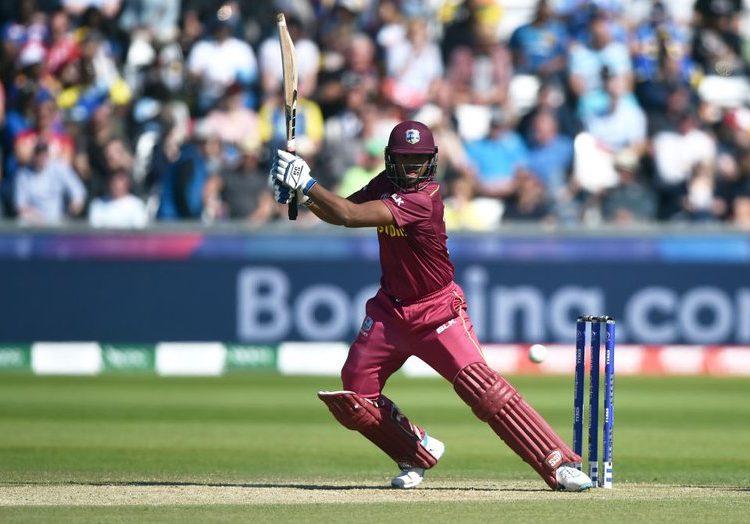
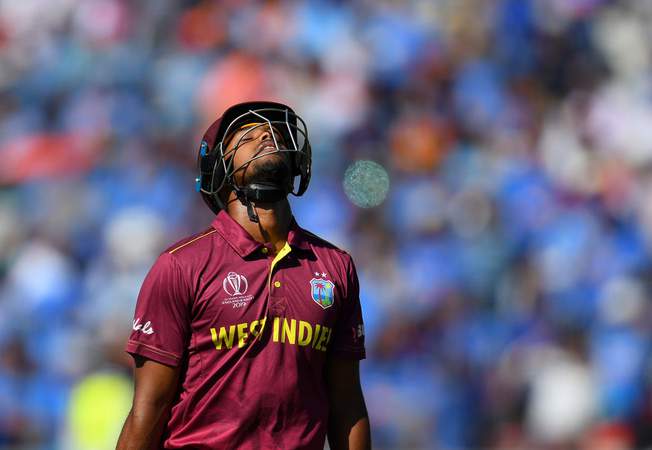
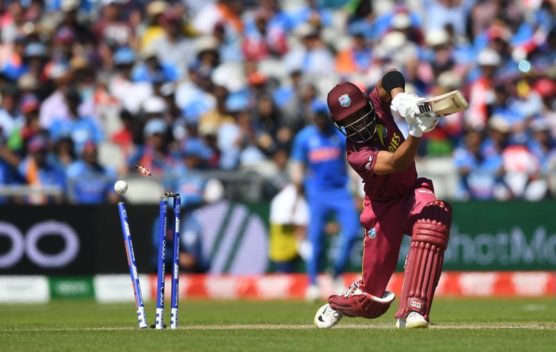
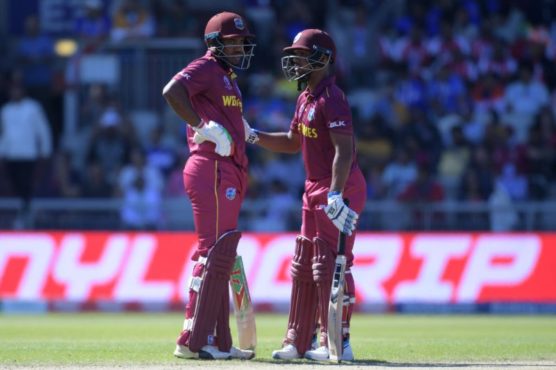
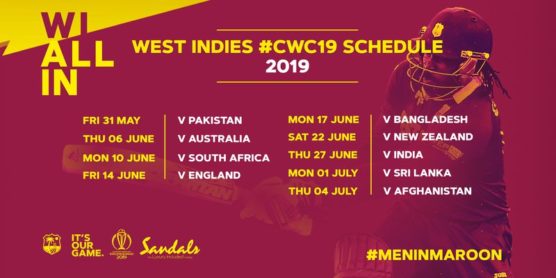
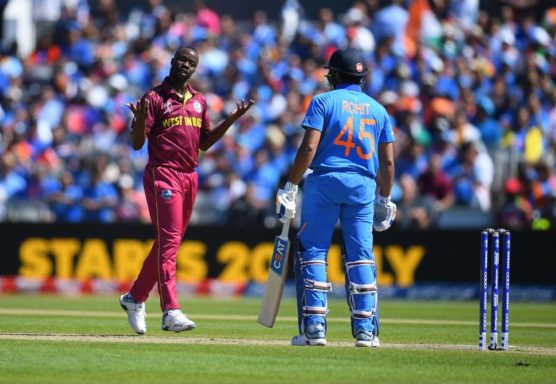
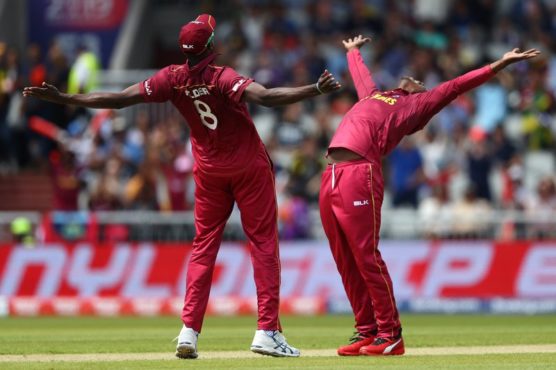
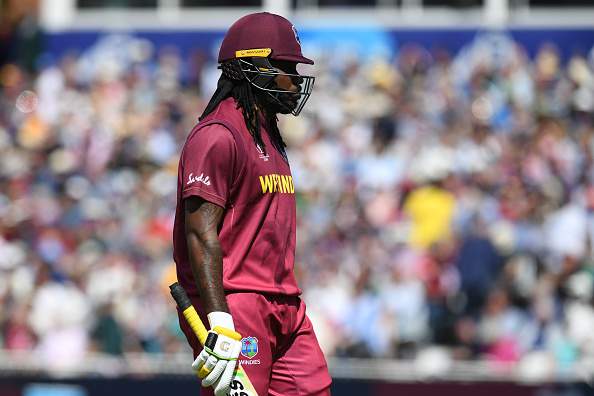

 They made the short journey over from the historic cricket venue to the Theatre of Dreams, and saw close up the majesty of the sporting arena. The tour included a trip into the players dressing room – which has hosted many legends of English and international football. They also heard about the history of the club, the legacy of the great manager Sir Alex Ferguson and received replica playing jerseys.
They made the short journey over from the historic cricket venue to the Theatre of Dreams, and saw close up the majesty of the sporting arena. The tour included a trip into the players dressing room – which has hosted many legends of English and international football. They also heard about the history of the club, the legacy of the great manager Sir Alex Ferguson and received replica playing jerseys.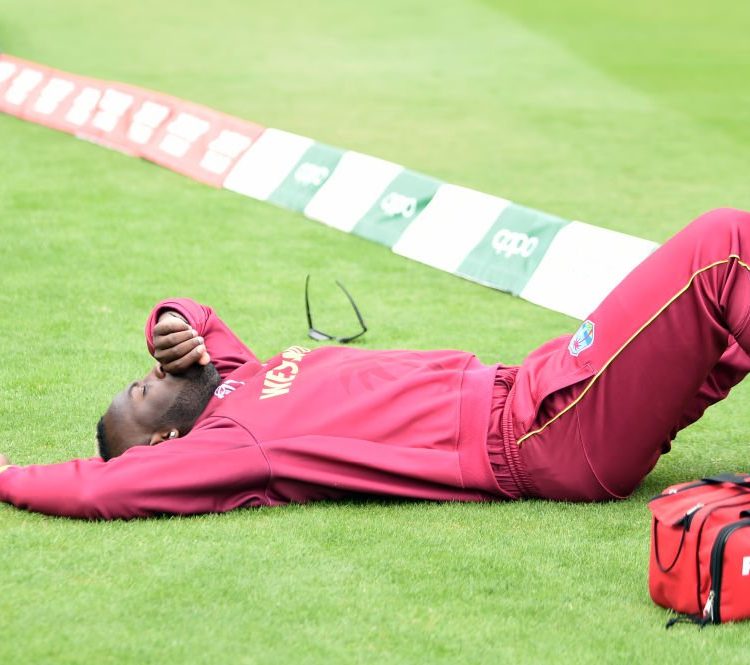


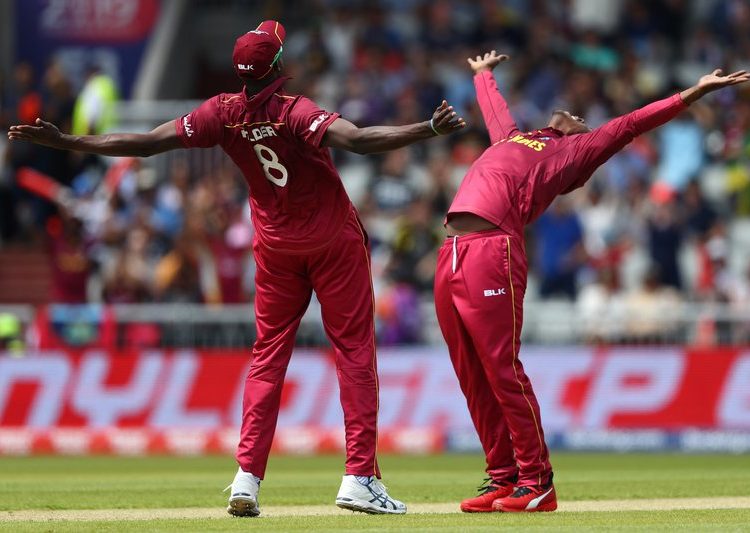
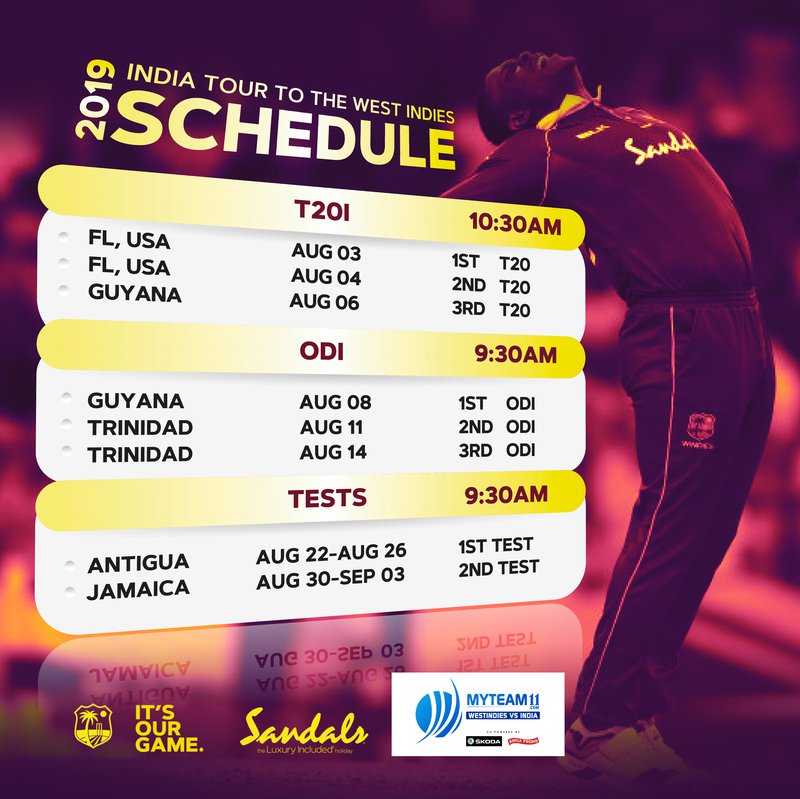
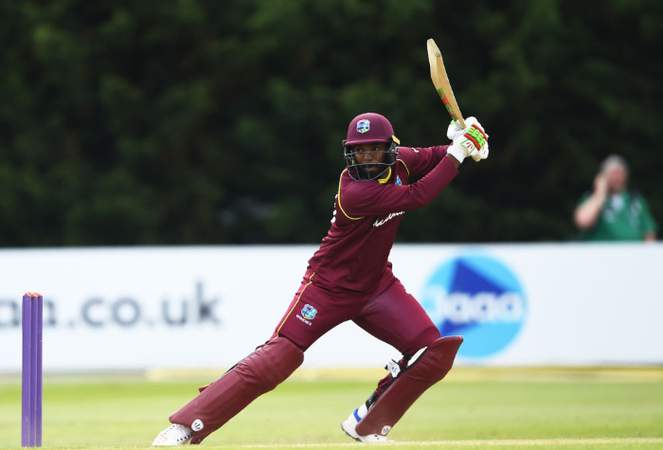
 He was a member of the squad which recently played in the Tri Nation Series in Ireland where he made his maiden international century. During that tournament he had scores of 38, 148, 23 and 69 not out.
He was a member of the squad which recently played in the Tri Nation Series in Ireland where he made his maiden international century. During that tournament he had scores of 38, 148, 23 and 69 not out. The replacement of a player requires the approval of the Event Technical Committee before the replacement player can be officially added to the squad.
The replacement of a player requires the approval of the Event Technical Committee before the replacement player can be officially added to the squad.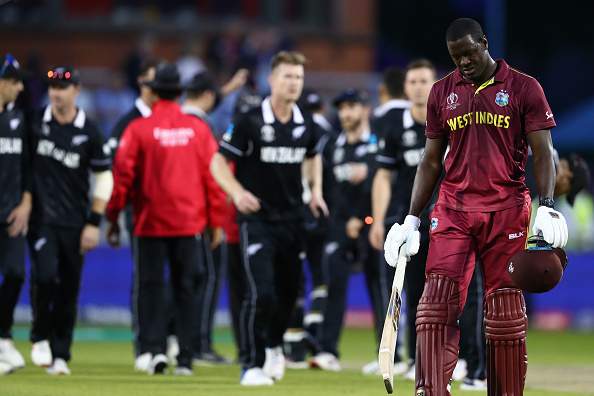

 When Brathwaite came to the crease, West Indies were 142-4. They were almost exactly halfway to their target, but it felt an awful lot further away than that. In the overs that followed, they lost
When Brathwaite came to the crease, West Indies were 142-4. They were almost exactly halfway to their target, but it felt an awful lot further away than that. In the overs that followed, they lost  From the moment he arrived at the crease, another 137 runs came from the bats of the West Indian side; 101 came from Brathwaite’s.
From the moment he arrived at the crease, another 137 runs came from the bats of the West Indian side; 101 came from Brathwaite’s. After those first 60 deliveries, he attacked 18 of the next 22. He made a break for it, and it was sustained. The 36 attacking shots Brathwaite played was the most he’s ever played in an ODI innings. It was twice as many as he’s ever played before in a single match.
After those first 60 deliveries, he attacked 18 of the next 22. He made a break for it, and it was sustained. The 36 attacking shots Brathwaite played was the most he’s ever played in an ODI innings. It was twice as many as he’s ever played before in a single match. But he picked his deliveries. This wasn’t indiscriminate slogging, in the slightest. Brathwaite knows his strengths and weaknesses all too well, and approached this task appropriately.
But he picked his deliveries. This wasn’t indiscriminate slogging, in the slightest. Brathwaite knows his strengths and weaknesses all too well, and approached this task appropriately. Few cricketers in the world are as intelligent in terms of using their skills as efficiently. His scoring yesterday was clinical, his attacking strokes destructive, but they came against full pitched bowling.
Few cricketers in the world are as intelligent in terms of using their skills as efficiently. His scoring yesterday was clinical, his attacking strokes destructive, but they came against full pitched bowling. Terrifyingly, out of nowhere, Williamson suddenly clocked what was going on. He tuned into the destruction, and knew what he had to do to get his side over the line.
Terrifyingly, out of nowhere, Williamson suddenly clocked what was going on. He tuned into the destruction, and knew what he had to do to get his side over the line. He was dismissed by a short ball. The only type of bowling he never got hold of. Williamson had sussed him, just in time.
He was dismissed by a short ball. The only type of bowling he never got hold of. Williamson had sussed him, just in time. It’s frustrating, but we can’t talk about this innings, without talking about that innings. Kolkata, April 3rd, 2016. Brathwaite does what we all know he did, hitting four consecutive sixes off Ben Stokes in the most remarkable end to a cricket match ever seen. We remember the way it all unfolded, the thrill, the shock, the name. The game was England’s, and then it was gone.
It’s frustrating, but we can’t talk about this innings, without talking about that innings. Kolkata, April 3rd, 2016. Brathwaite does what we all know he did, hitting four consecutive sixes off Ben Stokes in the most remarkable end to a cricket match ever seen. We remember the way it all unfolded, the thrill, the shock, the name. The game was England’s, and then it was gone.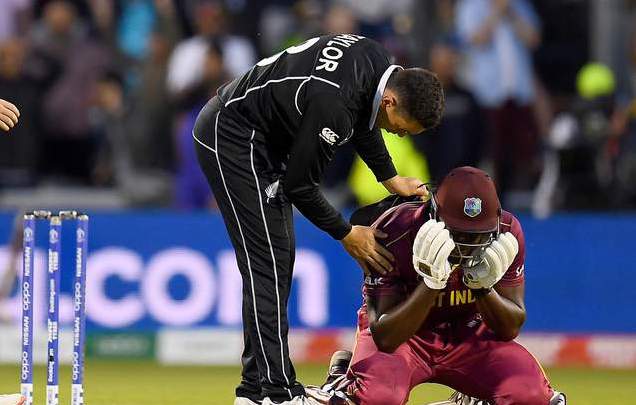
 Chasing 292 for victory at Old Trafford in their sixth match of the tournament, the West Indies were on the ropes at 167 for seven in the 27th over before Brathwaite followed up scintillating batting from
Chasing 292 for victory at Old Trafford in their sixth match of the tournament, the West Indies were on the ropes at 167 for seven in the 27th over before Brathwaite followed up scintillating batting from  Gayle and Hetmyer had provided the early entertainment in the chase and helped the West Indies recover from a shaky start that saw
Gayle and Hetmyer had provided the early entertainment in the chase and helped the West Indies recover from a shaky start that saw  Cottrell removed openers Martin Guptill and Colin Munro in the first over of the match, but he and the rest of the bowling failed to make inroads into the New Zealanders’ batting, as their opponents’ two most decorated batsmen, captain Kane Williamson and Ross Taylor breathed life into their side’s innings.
Cottrell removed openers Martin Guptill and Colin Munro in the first over of the match, but he and the rest of the bowling failed to make inroads into the New Zealanders’ batting, as their opponents’ two most decorated batsmen, captain Kane Williamson and Ross Taylor breathed life into their side’s innings.